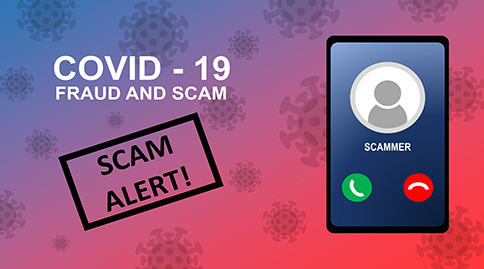As the COVID-19 situation continues to develop, your health and financial security continues to be our priority. Beware of the many circulating scams which exploit the fear and uncertainty surrounding the virus. Here are some of the most common ones:
The Fake Donation Funding Scam
In this scam, victims receive bogus emails, text messages or social media posts, asking them to donate money to a research team which is on the verge of developing a drug to treat COVID-19, and/or a vaccine to immunize the population against the virus. There have also been ads circulating on the internet with similar requests. Unfortunately, many of these are fake, and any money donated to these “funds” will go directly into the scammers’ pockets.
The Bogus Health Agency
There is so much conflicting information on the coronavirus, and unfortunately, scammers are exploiting this confusion. Scammers are sending out alerts that appear to be from the Centers for Disease Control and Prevention (CDC) or the World Health Organization (WHO), when in fact they’re fake communications created by the scammers themselves. These emails sport the logo of the agencies that allegedly sent them, and the URL is similar to those of the agencies as well. Some scammers will even invent their own “health agency,” such as “The Health Department,” taking care to evoke authenticity with (bogus) contact information and logos. Scammers want to spread misinformation and promote fear and confusion. Even worse, they can infect victims’ computers with malware which is then used to gather personal information from the infected devices. Believing these missives are sent by legitimate agencies, some people unfortunately fall victim to the scams.
The Phony Demand for Payment for Medical Services
In this case, victims receive bogus phone calls or emails, with the fraudster pretending to be a doctor or the hospital. The con artist claims to have treated a friend or loved one and demands payment for medical services. They direct the victim to wire or transfer funds to make payment. The victim is ultimately conned out of money without the loved one even being aware of what happened.
Counterfeit Treatments or Equipment
Be cautious of anyone selling products that claim to prevent, treat, diagnose, or cure COVID-19. Be alert to counterfeit products such as sanitizing products and personal protective equipment (PPE), including N95 respirator masks, goggles, full-face shields, protective gowns, and gloves.
Stimulus Check and Other Phishing Emails
Beware of phishing emails asking you to verify your personal information to receive an economic stimulus check from the government. Government agencies are not sending unsolicited emails seeking your private information to send you money.
Phishing emails may also claim to be related to charitable contributions, general financial relief, airline carrier refunds, fake cures and vaccines, and fake testing kits.
What can you do?
You can protect yourself.
- Basic preventative measures can keep scammers from making you their next target.
- Keep the anti-malware and antivirus software on your computer up-to-date and to strengthen the security settings on all of your devices.
Practice responsible browsing when online.
- Don’t share sensitive information such as your username, password, date of birth, social security number, financial data, or other personal information in response to an email or robocall.
- Do not open an attachment or click on links embedded in an email or social media post from senders you not recognize.
- Check for misspellings or wrong domains within a link (for example, an address that SHOULD end in “.gov” ends in “.com” instead).
- Verify web addresses of legitimate websites and manually type them into your browser. If you’re unsure about a website’s authenticity, check the URL and look for the lock icon and the “s” after the “http” which indicate that the site is secure.
Follow only official websites for information.
- Stay updated on the latest news about the coronavirus to avoid falling prey to misinformation.
- Check the official CDC and WHO websites for the latest updates. For more information on scams, visit the Federal Trade Commission website.
- Visit cdc.gov/niosh for more information about unapproved or counterfeit PPE. Information also is available from the U.S. Food and Drug Administration and the Environmental Protection Agency.
- The Consumer Financial Protection Bureau (CFPB) is also an excellent resource for information on protecting your finances during this time.
- Credit reporting agencies are offering free weekly online credit reports through April 2021. Visit the Annual Credit Report website to request your reports.



 How-to Videos
How-to Videos Contact
Us
Contact
Us Join Now
Join Now Branches & ATMs
Branches & ATMs Become a Member
Become a Member Make a Payment
Make a Payment Branches & ATMs
Branches & ATMs Contact Us
Contact Us
